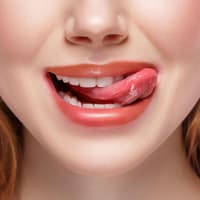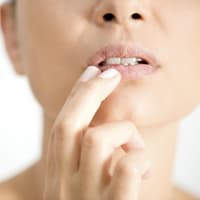
The causes: What is bad breath and how does it develop?
It is estimated that every third to fourth German suffers from bad breath. There are no exact figures on this. Bad breath is a sensitive issue that does not only affect those affected. The condition, known by the medical term halitosis, also causes discomfort for those around you. However, you must distinguish between temporary bad breath after eating and in the morning after getting up and chronic or illness-related bad breath, the causes of which are often to be found in the mouth, throat or stomach area.
Negligent oral hygiene and the resulting favorable formation of germs and bacterial cultures on the tongue and gums are one of the most common causes of bad breath. Inflammation, leftover food or teeth affected by caries further intensify this effect. The saliva produced for initial digestion, moisturizing and protecting the oral cavity plays a decisive role here. Too little saliva flow results in dry mouth and thus promotes the development of bacterial cultures and fungal growth, which in turn can trigger the putrid odor. Your nose and throat are also places where secretions and mucus are produced to protect them from germs and dirt particles carried in the air you breathe. Damage to your nasal mucosa or its dehydration can also lead to reduced secretion production and thus to bacterial growth and bad breath.
Causes of bad breath in the digestive tract are much rarer, but should also be considered as a possible factor. Diseases such as heartburn or esophagitis can cause symptoms such as bad breath and should be examined and treated by a doctor. Intolerances or food allergies such as lactose intolerance should also be clarified in order to identify them as a possible cause of bad breath.
Diagnosis: bad breath - but what is the cause?
How exactly can bad breath be diagnosed? You or people close to you, with whom you can talk confidentially about this often unpleasant topic, are probably best placed to do this. To protect your own health, you should also carefully monitor your oral hygiene and document any changes, as serious physical illnesses could be the cause.
A medical diagnostic procedure for bad breath is a gas analysis at the dentist. Your breath is analyzed and possible causes can be identified. If there are indications of underlying illnesses or factors, your doctor will initiate further examinations, such as breathing and bronchial tests or imaging procedures in the stomach and oesophagus.
Treatment methods: What can be done about this annoying ailment?
The easiest way to reduce bad breath is regular and proper oral hygiene. Brushing your teeth and using dental floss to remove food debris from between your teeth are an important basis for controlling the production of germs on your gums and tongue. If you wear dentures or braces, you should also remember to clean them regularly so as not to jeopardize your oral hygiene.
A poor diet with too much sugar, alcohol and fatty foods can also make a negative contribution and, among other things, promote dehydration of the oral cavity. Smoking is also known for its negative effects on breath and teeth and should be given sufficient consideration and ideally given up. Of course, regular visits to the dentist to rule out possible causes such as tooth decay and inflammation of the gums or throat are essential for your oral hygiene.
In addition to the medicines available in pharmacies, there are undoubtedly plenty of simple household remedies that can help you in your fight against bad breath:
- Probiotics are a tried and tested insider tip for supporting oral flora. In various forms, they support the gastrointestinal tract as well as the oral cavity, which is involved in digestion for saliva supply and food grinding.
- A very simple, yet effective method against unwanted bad breath is also to drink enough fluids. Drinking water regularly not only promotes your general health and has a positive effect on the appearance of your skin, but also prevents dehydration of risk areas such as the throat and mouth. However, you should avoid consuming excessive amounts of sugary drinks and coffee.
- Another natural home remedy for persistent bad breath is various herbs such as sage, mint and camomile, as well as parsley, which strengthen the environment in the mouth and throat and eliminate bacteria.
You might also be interested in this:
Achieving healthy gums with ease
Toothpaste with fluoride: how dangerous is the substance?
Tongue symptom indicator: Recognizing diseases at a glance
What to do about dry mouth?
Healthy teeth, healthy body: How our teeth affect our health






